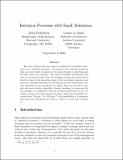| dc.contributor.author | Fudenberg, Drew | |
| dc.contributor.author | Imhof, Lorens | |
| dc.date.accessioned | 2009-07-15T13:28:53Z | |
| dc.date.issued | 2006 | |
| dc.identifier.citation | Fudenberg, Drew, and Lorens A. Imhof. 2006. Imitation processes with small mutations. Journal of Economic Theory 131, no. 1: 251-262. | en |
| dc.identifier.issn | 0022-0531 | en |
| dc.identifier.uri | http://nrs.harvard.edu/urn-3:HUL.InstRepos:3190369 | |
| dc.description.abstract | This note characterizes the impact of adding rare stochastic mutations to an “imitation dynamic,” meaning a process with the properties that absent strategies remain absent, and non-homogeneous states are transient. The resulting system will spend almost all of its time at the absorbing states of the no-mutation process. The work of Freidlin and Wentzell [Random Perturbations of Dynamical Systems, Springer, New York, 1984] and its extensions provide a general algorithm for calculating the limit distribution, but this algorithm can be complicated to apply. This note provides a simpler and more intuitive algorithm. Loosely speaking, in a process with K strategies, it is sufficient to find the invariant distribution of a K×K Markov matrix on the K homogeneous states, where the probability of a transit from “all play i” to “all play j” is the probability of a transition from the state “all agents but 1 play i, 1 plays j” to the state “all play j”. | en |
| dc.description.sponsorship | Economics | en |
| dc.language.iso | en_US | en |
| dc.publisher | Elsevier | en |
| dc.relation.isversionof | http://dx.doi.org/10.1016/j.jet.2005.04.006 | en |
| dash.license | LAA | |
| dc.subject | Markov chain | en |
| dc.subject | limit distribution | en |
| dc.subject | imitation dynamics | en |
| dc.subject | ergodic distribution | en |
| dc.title | Imitation Processes with Small Mutations | en |
| dc.relation.journal | Journal of Economic Theory | en |
| dash.depositing.author | Fudenberg, Drew | |
| dc.identifier.doi | 10.1016/j.jet.2005.04.006 | * |
| dash.contributor.affiliated | Fudenberg, Drew | |


